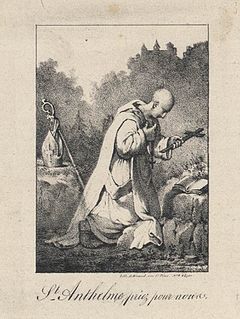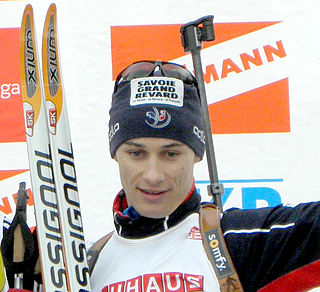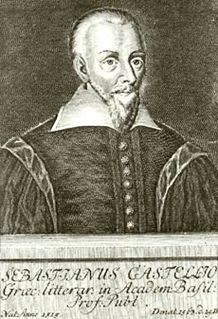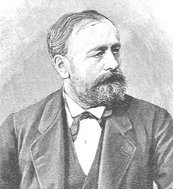 W
WAmadeus V, surnamed the Great for his wisdom and success as a ruler, was the Count of Savoy from 1285 to 1323. He established Chambéry as his seat. He was the son of Thomas II of Savoy and Beatrice Fieschi.
 W
WAmadeus VI, nicknamed the Green Count was Count of Savoy from 1343 to 1383. He was the eldest son of Aymon, Count of Savoy, and Yolande Palaeologina of Montferrat. Though he started under a regency, he showed himself to be a forceful leader, continuing Savoy's emergence as a power in Europe politically and militarily. He participated in a crusade against the Turks who were moving into Europe.
 W
WAnthelm of Belley (1107–1178) was a prior of the Carthusian Grand Chartreuse and bishop of Belley.
 W
WAlexis Bœuf is a retired French biathlete. First World Cup podium was in Antholz-Anterselva Individual 21 January 2010. He won Presque Isle pursuit in February 2011, his only World Cup victory.
 W
WJean-Allarmet de Brogny was a French Cardinal.
The House of Candia was a noble family from Savoy (14th-16th). It held a castle at Chambéry-Le-Vieux under the name "Château de Candie".
François de Candie was a savoyard nobleman named Vidame of Geneva from 1377 to 1385 and captain of the castle of l'Ile sur le Rhône in 1377. In 1368, he received from princess Mathide of Savoy the lordship on the castles of Salagine in Bloye and Rumilly, Haute-Savoie.
 W
WSebastian Castellio was a French preacher and theologian; and one of the first Reformed Christian proponents of religious toleration, freedom of conscience and thought.
 W
WFrancesco Adriano Ceva was a Catholic Cardinal from Savoy.
 W
WEustace Chapuys, the son of Louis Chapuys and Guigonne Dupuys, was a Savoyard diplomat who served Charles V as Imperial ambassador to England from 1529 until 1545 and is best known for his extensive and detailed correspondence.
 W
WEmmanuel Philibert of Savoy, 2nd Prince of Carignano, Prince of Carignano, was the son and heir of Thomas Francis, Prince of Carignano. He constructed the Palazzo Carignano in Turin.
 W
WEmmanuel Philibert was Duke of Savoy from 1553 to 1580. He is remembered for the Italianization of the House of Savoy, as he recovered the savoyard state following the Battle of St. Quentin (1557) and subsequently moved the capital to Turin and made Italian the official language in Piedmont.
 W
WThomas I de Gadagne, known as Thomas the Rich was a banker from a rich Florentine family who settled in Lyon in France, where he built up trading, banking and industrial business interests in Lyon and Florence. He made a huge fortune and lent large sums to the kings of France to support their military expeditions to Italy and to finance a French expedition to the Americas.
 W
WArnold van Gennep, in full Charles-Arnold Kurr van Gennep was a Dutch-German-French ethnographer and folklorist.
 W
WHyacinthe Sigismond Gerdil, CRSP was an Italian theologian, bishop and cardinal, who was a significant figure in the response of the papacy to the assault on the Catholic Church by the upheavals caused by the French Revolution.
 W
WOtto de Grandson, sometimes numbered Otto I to distinguish him from later members of his family with the same name, was the most prominent of the Savoyard knights in the service of King Edward I of England, to whom he was the closest personal friend and many of whose interests he shared.
 W
WJean I de Grailly was the seneschal of the Duchy of Gascony from 1266 to 1268, of the Kingdom of Jerusalem from about 1272 until about 1276, and of Gascony again from 1278 until 1286 or 1287.
 W
WJoseph-Marie, comte de Maistre was a Savoyard philosopher, writer, lawyer and diplomat who advocated social hierarchy and monarchy in the period immediately following the French Revolution. Despite his close personal and intellectual ties with France, Maistre was throughout his life a subject of the Kingdom of Sardinia, which he served as a member of the Savoy Senate (1787–1792), ambassador to Russia (1803–1817) and minister of state to the court in Turin (1817–1821).
 W
WPeronet Lamy, called Perenet lenlumineur, was a Gothic painter and manuscript illuminator who spent his career in the employ of the House of Savoy.
 W
WPeter of Aigueblanche was a medieval Bishop of Hereford. A nobleman from Savoy, he came to England as part of the party accompanying King Henry III's bride Eleanor of Provence. He entered the royal service, becoming bishop in 1241. He then served the king for a number of years as a diplomat, helping to arrange the marriage of Prince Edward. Peter became embroiled in King Henry's attempts to acquire the kingdom of Sicily, and Peter's efforts to raise money towards that goal brought condemnation from the clergy and barons of England. When the barons began to revolt against King Henry in the late 1250s and early 1260s, Peter was attacked and his lands and property pillaged. He was arrested briefly in 1263 by the barons, before being mostly restored to his lands after the Battle of Evesham.
 W
WMaster James of Saint George ,(French Maitre Jacques de Saint-Georges),(Old French Mestre Jaks),(Latin Magistro Jacobo de Sancto Georgio), was a master of works/architect from Savoy, described by historian Marc Morris as "one of the greatest architects of the European Middle Ages". He was largely responsible for designing King Edward I's castles in North Wales, including Conwy, Harlech and Caernarfon and Beaumaris on Anglesey.
 W
WSimone Antonio Pacoret de Saint-Bon was an admiral of the Italian Regia Marina.
 W
WPierre de Thury was a French bishop and cardinal of the Avignon Obedience, who served as a royal secretary and Master of Requests, and then as papal Nuncio and Apostolic Legate on several occasions. He participated in two papal elections, those of 1394 and 1409, and was a prominent member of the Council of Pisa in 1409.
 W
WBlessed Sebastian Valfrè, C.O. was a Catholic priest and a member of the Oratory of Saint Philip Neri. He is called the Apostle of Turin for his long years of service to the people of that city, where he served as the provost of the local Oratory for many years.
 W
WWilliam of Savoy was a bishop from the House of Savoy. He was a son of Thomas, Count of Savoy and Margaret of Geneva. He was elected bishop of Valence in 1224. He negotiated the weddings of queens, and was an advisor to Henry III of England. Between his religious roles and his family relations, his influence was noted from London to Rome.